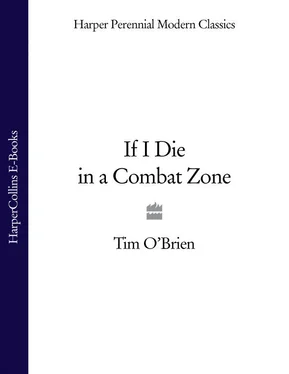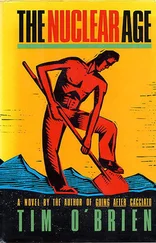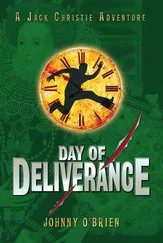Blyton has Kline hang on to his left foot for an hour.
During the days of basic training and during the nights, we march. And sing. There are a thousand songs.
Around her hair
She wore a yellow bonnet.
She wore it in the springtime,
In the merry month of May.
And if
You ask
Her
Why the hell she wore it:
She wore it for her soldie
Who was far, far away.
You write beautifully, a girl says in her letters. You make it all so terrible and real for me … I am going to Europe next summer, she writes, and I’ll see a lot of places for you. As ever …
If I had a low IQ,
I could be a Lifer, too!
And if I didn’t have a brain,
I would learn to love the rain.
Am I right or wrong?
Am I goin’ strong?
Sound off!
Sound off!
One, two, three, four …
Sound Off!
We march to the night infiltration course. They use machine guns on us, firing overhead while Erik and Harry and White and Kline crawl alongside me, under barbed wire, red tracers everywhere, down into ditches, across the finish line. In the rain. Then in dead night we march back to the barracks.
Viet-nam
Viet-nam
Every night while you’re sleepin’
Charlie Cong comes a creepin’
All around.
We march to the Quick-Kill rifle range. We learn to snap off our shots, quickly, rapidly, without conscious aim. Without any thought at all. Quick-Kill.
We march to the obstacle course, and Blyton shoves Kline through the manoeuvres.
We march back to the barracks, and we are always singing.
If I die in a combat zone,
Box me up and ship me home.
An’ if I die on the Russian front,
Bury me with a Russian cunt.
Sound Off!
We march to the bayonet course, marching through green forests, through the ever-rain and through smells of rich loam and leaves and pine and every fine scent of nature, marching like toys under the free, white mountain, Rainier.
Blyton teaches us and taunts us. Standing with his legs spread wide on an elevated platform, he gives us our lesson on the bayonet. Left elbow locked, left hand on wood just below weapon’s sights, right hand on small of stock, right forearm pressed tightly along the upper stock, lunge with left leg, slice up with the steel. Again and again we thrust into mid-air imagined bellies, sometimes towards throats. ‘Dinks are little shits,’ Blyton yells out. ‘If you want their guts, you gotta go low. Crouch and dig.
‘Soldiers! Tell me! What is the spirit of the bayonet?’ He screams the question, rolling it like Sandburg’s poetry, thundering.
Raise your rifle, blade affixed, raise it high over your head, wave it like a flag or trophy, wave it in love, and bellow till you’re hoarse: ‘Drill Sergeant, the spirit of the bayonet is to kill! To kill!’
I know a girl, name is Jill,
She won’t do it, but her sister will.
Honey, oh, Baby-Doll.
I know a girl, dressed in black,
Makes her living on her back.
Honey, oh, Baby-Doll.
I know a girl, dressed in red,
Makes her living in a bed.
Honey, oh, Baby-Doll.
There is no thing named love in the world. Women are dinks. Women are villains. They are creatures akin to Communists and yellow-skinned people and hippies. We march off to learn about hand-to-hand combat. Blyton grins and teases and hollers out his nursery rhyme: ‘If ya wanta live, ya gotta be ag-ile, mo-bile, and hos-tile.’ We chant the words: ag-ile, mobile, hos-tile. We make it all rhyme. We march away, singing.
I don’t know, but I been told,
Eskimo pussy is mighty cold.
Am I goin’ strong?
Am I right or wrong?
Sound Off!
The company forms up for inspection. The battalion commander comes by in his dark glasses, and Blyton and the others are firm and mellow. We’ve been given instructions to say ‘No, sir’ when the colonel asks if we have any problems or any complaints or any needs. When he asks if there’s enough food and if we get enough sleep, we’re supposed to say ‘Yes, sir’. ‘No, sir’. ‘Yes, sir’.
They stuff us into the barracks at ten o’clock. The squad leader gears us up for night-time cleaning. He promises to allow an extra half-hour of sleep in the morning, and we know he’s lying, but the floor gets waxed and our shoes get shined and the lockers get wiped.
Blyton comes in and cusses and crams the light off and by eleven o’clock all the boors and frightened men snort their way to sleep. It is a cattle pen. Seething and stirring in their sleep or on their way to sleep, the men are animals, restless and caged. A giant rhythm takes up the barracks, a swelling and murmuring of human hearts and lungs; the wooden planks seem to move, in and out. You fight to hold to the minutes. Sleep is an enemy. Sleep puts you with the rest of them, the great, public, hopeless zoo. You battle hard complaint from the body. Then you sleep; dark, uneasy hum in your ears, as if you are in a beehive.
In the deep, red heart of the sleep, you are awakened. Fire watch. You sit on the darkened stairs between the two tiers of bunks, and you smoke. Fire watch is a good duty. You lose sleep at it, but the silence and letter-writing time and privacy make up for it, and you are free for an hour. The rain is falling, and you feel comfortable. You listen, smiling and smoking. Will you go to war? You think of Socrates; you see him beside you, stepping through basic training as your friend. He would be a joke in short hair and fatigues. He would not succumb. Certainly he would march through the days and nights in his white robes, with a white beard, and certainly Blyton would never break him. Socrates had fought for Athens: it could not have been a perfectly just war. What had he thought? Socrates, it has been told, was a brave soldier. You wonder if he had been a reluctant hero. Had he been brave out of a spirit of righteousness or necessity? Or resignation? You wonder how he felt, not how he thought, as a soldier on a night like this one, with the rain falling with just this temperature and sound. Then you think of him as an old man, you remember his fate, you think of him peering through iron bars as his ship sailed in, the final cue, only extinction ahead; his country, for which he had been a hero, ending the most certain of good lives. Nothing recorded about his weeping. But Plato may have missed something. Certainly, he must have missed something. You think about other heroes. John Kennedy, Audie Murphy, Sergeant York, T. E. Lawrence. You write letters to blonde girls from middle America, calm and poetic and filled with ironies and self-pity, then you smoke, then you rouse out Kline for the watch, and you go back to your bunk wondering what the fat man will think about for his hour.
Erik and I were discussing these things on that September afternoon, sitting behind the barracks and separating ourselves from everyone and putting polish on our boots, when Blyton saw us alone. He screamed and told us to get our asses over to him pronto.
‘A couple of college pussies,’ he said when we got there. ‘Out behind them barracks hiding from everyone and making some love, huh?’ He looked at Erik. ‘You’re a pussy, huh? You afraid to be in the war, a goddamn pussy, a goddamn lezzie? You know what we do with pussies, huh? We fuck ’em. In the army we just fuck ’em and straighten ’em out. You two college pussies out there hidin’ and sneakin’ a little pussy. Maybe I’ll just stick you two puss in the same bunk tonight, let you get plenty of pussy so tomorrow you can’t piss.’ Blyton grinned and shook his head and said ‘shit’ and called another drill sergeant over and told him he had a couple of pussies and wanted to know what to do. ‘They was out there behind the barracks suckin’ in some pussy. What the hell we do with puss in the army? We fuck ’em. don’t we? Huh? College puss almost ain’t good enough for good fuckin’.’
Читать дальше












